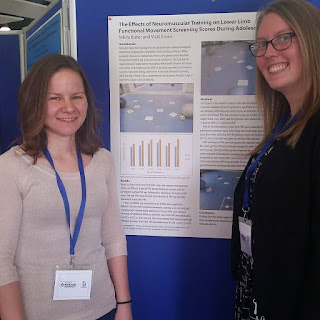As first year Sport Rehabilitation students, we were excited
to attend the BASES Student Conference for the first time. As the theme was
clinical sport and exercise science, we were expecting to be out of our depth
with the content. However, we found that the topics discussed were extremely
relevant to our degree which gave us potential to pick up some top tips along
the way.
 |
| BSc Rehabilitation in Sport and Exercise students Amy Day, Becky Jacob-Harris, Heli Radcliffe & Laura Woodbridge. |
Combined, we covered a number of talks, presentations and workshops
to which we shared with each other over a cup of tea.
TOP TIP #1: ALWAYS ATTEND CONFERENCES WITH A GROUP OF FRIENDS IN ORDER TO ATTEND THE MOST TALKS!
Once registered, we headed
for the morning’s welcome talk and key note speaker – Professor Keith George.
His ideas and research into the potential of overdosing on exercise was very
insightful and put the Government’s guide lines into perspective. Perhaps
little and often is sufficient?
Next up – poster sessions and oral communications. This gave
undergraduate and postgraduate students from all over the country the chance to present their
dissertation and research findings to fellow students and staff. There were some really
interesting ideas and concepts, and as a first-year student – some inspiration
to get thinking about our own dissertations.
 |
| Plymouth Marjon University Student Nikita Baker (right) with her dissertation supervisor Vicki Evans |
Our workshop highlights included;
The Application of Ultrasonography in Sports Medicine and Rehabilitation with Dr Gary Shum and Dr Giorgos Sakkas – during this workshop we were given a short lecture on the benefits and the theory behind using an ultrasound as well as having the opportunity to practice on each other – which we weren’t expecting to do before our third year.
 |
| Opportunities to put our Anatomy into Practice with the Diagnostic Ultrasound |
“Rocket and beetroot
science: Dietary Nitrate and exercise performance” with Professor Andy Jones –
despite the taste, beetroot is surprisingly good for you. Two shots (140mls) a
day can improve performance, muscle efficiency, blood pressure and
endurance.
“Biomechanical risk factors for stress fracture development
during Royal Marine training” with Dr Sharon Dixon – This presentation was
based around the anthropometric features which may predispose recruits to
stress fractures and a review of the types of footwear supplied by the
Military. We found that Dr Dixon was very enthusiastic about sharing hints and
tips for potential dissertation ideas.
 |
| Inspired for our Dissertations after Dr Sharon Dixon's talk |
Ben Jane and Dr Saul
Bloxham explored group physical activity in relation to NHS
treatments, focusing mainly on back pain and cancer patients. This workshop
looked into the ways of keeping individuals of all ages active, prescribing
basic exercises which can easily be carried out at home when completing daily
tasks. As a group, we tried a few exercises and discussed the importance of
keeping individuals active through person centred care. As a result of this
workshop, we gained insights into potential placement opportunities for the
next Academic year!
There were a number of networking opportunities throughout
the two days where we were able to meet students from all over the UK, as well
as professors, doctors and other subject professionals.
Looking forward to attending Northumbria in 2018, and
hopefully we can present at BASES 2019!
 |
| Plymouth Marjon University staff enjoying the BASES evening meal |
Blog contribution from BSc (Hons) Rehabilitation in Sport and Exercise students Amy Day, Becky Jacob-Harris, Heli Radcliffe and Laura Woodbridge.
For more information about our Sport and Health Science undergraduate and postgraduate courses please visit our website
Blog edited by Sarah Martin, lecturer in Sports Therapy and Rehabilitation and course leader for MSc Sport Rehabilitation; smartin@marjon.ac.uk.


No comments:
Post a Comment